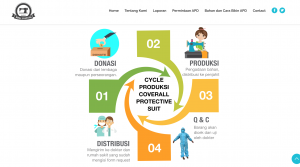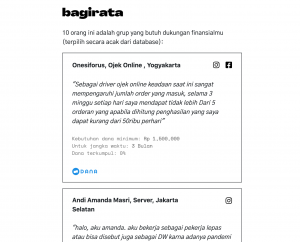Indonesia, like many countries, faces a momentous challenge in the COVID-19 pandemic. The country faces skyrocketing unemployment numbers and a strained medical and healthcare system. The governmental response has been slow, but its people are resilient, and have learned to band together and help one another during these tough times. It has happened before, like when donations poured in after the Yogyakarta earthquake in 2006 and in the wake of the earthquake and tsunami that hit Sulawesi in 2018.
This time, some forward-thinking figures in Indonesia have utilized open source tools to build platforms that tackle a variety of social and economic problems brought on by the coronavirus.
Budhi Hermanto, a Yogyakarta-based activist, is extremely concerned about the lack of personal protective equipment (PPE) for health workers treating COVID-19 patients. “It’s like they are working on a suicide mission because of the lack of PPE,” he told KrASIA.
Hermanto acted quickly, and started the Majelis Mau Jahitin (“want to sew”) initiative, or Mamajahit, in mid-March. The idea is simple: health facilities can make requests for essential equipment—medical gowns, safety goggles, face shield, and hazmat suits—through Google Forms, and then tailors working with Mamajahit will produce them and deliver them for free.

Currently, Mamajahit is run by a network of at least 70 volunteers, 62 of whom are tailors. More than half are based in Yogyakarta. The tailors are grouped into production units consisting of eight to ten people, including one unit leader that distributes tasks.
An initial concern was that the PPE made under Mamajahit’s umbrella might be substandard. Some of the gear that had been donated to medical personnel by other groups or individuals didn’t meet requirements set out by the World Health Organization and Indonesian Ministry of Health, and the Indonesian Medical Association (IDI) had raised alarm about the quality of equipment that had been shipped to medical workers.
Hermanto took precautionary steps to avoid this problem. He conducted research about the materials that were fit for PPE, and consulted medical professionals to make sure that he was on the right track. He decided that Mamajahit’s hazmat suits would be made with waterproof spunbond fabric of at least 70 gsm. Then, the first prototypes were sent to doctors and various centers for disease control and prevention in Yogyakarta for feedback.
“After ensuring that our hazmat suits meet the requirements and can be safely worn, our tailors started mass-producing them,” he said.
With solid control over the quality of its output, Mamajahit then teamed up with an initiative called JogjaLawanCorona (“Yogyakarta against corona”) to raise funds, which would cover the production and distribution costs. So far, the organizations have raised more than IDR 156 million (USD 10,570). To keep things transparent, Mamajahit uploads the latest expense reports to its website regularly.
As of May 16, Mamajahit had produced more than 19,000 hazmat suits, 5,000 face shields, 86 medical gowns, and bought 200 pairs of safety goggles for 230 health facilities across Indonesia. The initiative still receives requests from hospitals around the country.
Yet that output is far from what’s actually needed by Indonesia’s frontline medical workers. “We are unable to fulfill all requests, especially from hospitals outside Java [Indonesia’s main island],” said Hermanto. The organization has limited manpower, and they also need to contend with logistics issues.
When Hermanto sat with me for an interview, he received a request from a hospital in West Nusa Tenggara, more than 1,000 km from his home base.
A horizontal safety net
In April and May, three million jobs were lost in Indonesia due to COVID-19, and about 70 million informal workers are in precarious living situations. Local media has reported cases about people who cannot afford food or rent, especially in big cities like Jakarta.
Early last month, four young people—Lody Andrian, Ivy Vania, Rheza Boge, and Elham Arrazag—decided to start Bagirata, a “matchmaking” platform for Indonesians to redistribute their income among people who have lost theirs.

“What I observed was that workers lost their top-down ‘safety net’ [created by the government and companies], so the support system that is left is only from other citizens. We had the idea to create a horizontal solution,” said Andrian.
Bagirata utilizes various open source tools, such as Google Sheets and Google Forms, to collect information. It hosts an unemployment database specifically for hospitality services, the creative industry, and gig workers—the founders’ fields of work. Anyone who is unemployed can submit a request that indicates the amount of funds they need and descriptions of their current living situation, along with the QR code for their personal e-wallet. Donors then skim through the posts and transfer money to the people they want to help.
Volunteers authenticate all requests submitted to the platform to ensure that they are genuine and to avoid overlaps. Where possible, the requests include links to the applicants’ social media accounts for donors to see. As of May 15, Bagirata has distributed almost IDR 172 million (USD 11,700) to 752 recipients from 958 donors.
At first glance, Bagirata works like other peer-to-peer funding platforms, such as Kitabisa, which charges a 5% administration fee for each fundraising campaign on its platform. However, Andrian emphasized that Bagirata is “conceptually different.”
Read this: Kitabisa ‘connects kindness’ in Indonesia
“We don’t ‘pool’ the donor money, we let each individual transfer their donation directly to the recipients in need. Bagirata is a community-driven tool, where we encourage the public to maintain this platform. We are fully volunteer-based, so we don’t take commission,” he said.
Redirecting government assistance
The government has set aside a whooping IDR 20 trillion (USD 1.36 billion) for an unemployment assistance program built around the pre-employment card, specifically targeting workers who have been laid off or furloughed due to the pandemic. Partnering with companies like Tokopedia, Ruangguru, and Ovo, the program offers online courses that cover a wide range of topics, such as investment, programming, and digital marketing. But participants must pay tuition.
In all, 5.6 million people with pre-employment cards will receive a stipend of IDR 3.5 million (USD 237) each, one-third of which is meant for payments for online classes. Each class costs between IDR 100,000 and 1 million (USD 7–68).
Many experts have criticized this governmental program because most of its online classes are similar to materials that can be accessed for free elsewhere on the internet. For example, there are classes for “how to ace your interview” and “basic e-mail correspondence skills”; both cost USD 7 per signup.
Read this: How Indonesia’s pre-employment card program is boosting the education tech sector
Rather than helping those in need, the program seems to funnel tuition toward the government’s platform-partners. And beyond that, many people have complained about the complicated registration procedures that don’t guarantee access to the online courses. The program has a confusing verification process, and some have had difficulties while attempting to log in. A month after its launch, only 680,000 people are enrolled—far from covering the pool of 8.6 million applicants. That count even falls short of the target set by the government. It had expected to be serving 800,000 users by now.
This problem kindled Andre W. Kusuma and Brahmantya Sakti’s drive to start Prakerja.org, a site hosting free online learning materials that are similar to the paid classes in the government’s unemployment program. Prakerja’s courses are compiled from multiple sources, such as YouTube and competent instructors who submit their own videos. To make it easy to remember, the platform’s name is similar to the pre-employment card’s official site, Prakerja.go.id.

“This website aims to show that there are many alternatives for people to get free training,” said Kusuma during a video conference. The platform’s materials are divided into five categories—entrepreneurship and business ideas, self-improvement, business and finance, technology and software, as well as digital business.
The founders themselves curated all materials that are posted on Prakerja.org, ensuring that the content is of decent quality. The benefits are twofold—financial assistance from the government can be spent on more pressing needs, and any Indonesian can use Prakerja.org to improve their skills without navigating complicated procedures.
What comes next?
Mamajahit, Bagirata, and Prakerja.org all offer much-needed assistance to people who have been negatively affected by COVID-19. When the pandemic subsides, they will shut down or operate in a different capacity.
“For our PPE production activity, once all health workers get the protection they need, we will likely stop,” said Hermanto. He hasn’t thought about what may become of Mamajahit in the future.
As for Andrian and his friends, they have already decided to turn Bagirata’s system into an open source program that can be replicated by other communities. This way, if another crisis arises in the future, the public will have access to this mode of crowdsourced assistance. “We hope that this cross-subsidization method can be a safety net for citizens, and that people are not just waiting for help from a slow and bureaucratic government,” he said.
Grassroots efforts have filled some of the gaps in Indonesia’s collective response to the pandemic. Perhaps their existence highlights some of the inefficiencies in the governmental system, be they ineffectual policies or execution made slow by a convoluted bureaucracy.


